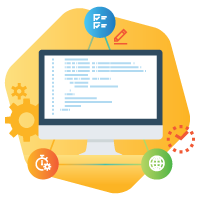Why Implement MLOps?
Benefits of MLOps
After the deployment of models, when the challenges and unaccounted use cases spring up, the MLOps come into the picture. The model has to update itself to make the most out of it across different KPIs, including streamlining the decision-making process.
Machine learning operations provide the technology that helps to deploy, monitor, and manage ML production. Whereas MLOps employment helps scale the ML operations as it automates the processes, validates, and tests it to develop a repeatable process managed in a dynamic environment.
There are multiple benefits to MLOps:
MLOps Offerings
Evolve your e-commerce platform to a Marketplace with advanced functionalities ensuring high-performance operations
Our Approach
Our Process
Our Approach
Why Royal Cyber?
Frequently Asked Questions
01. What is machine learning operations (MLOps)?
Machine learning operations, or MLOps, is a set of practices to create and deliver machine learning models through reproducible, effective workflows. MLOps facilitates continuous delivery of top-performing ML tools into production at scale and understands the needs of ML to define a new lifecycle for SDLC and CI/CD processes.
02. What does a machine learning consultant do?
A professional machine learning consultant will be involved in different teams, including data science, software development, and data engineering. The experts will guide relevant stakeholders on how to train models through model testing, model management, and model maintenance; package models and make them ready for execution in an ideal runtime environment; assure models by measuring candidate models against set metrics; deploy and monitor models to understand behavior, validate accuracy and results; and more.
03. What are the benefits of MLOps?
Machine learning operations offers a plethora of benefits for organizations, including delivering more models at a faster pace; optimizing ROI and lowering infrastructure expenses; enhancing business agility by creating automated pipelines and workflows to control your costs and provide a competitive edge at the same time; and acquire business protection by minimizing risk through enterprise-level governance and security throughout all types of data, infrastructure, and models, etc.
04. Why do I need MLOps?
You need MLOps if your business is indicating the following signs:
- It’s becoming increasingly difficult to manage different tools, frameworks, and languages used for data science activities.
- Although you’ve increased your investment in ML, still deploying a new model to production isn’t taking any less time.
- You cannot keep track of multiple models available in your catalog, and you’re practicing manual model version control.
- You’re running ML in a hybrid environment.
- You’re executing multiple types of workloads ranging from legacy batch to real-time inference.
- Your IT team is facing difficulty answering internal questions regarding security, cost controls, and performance KPIs.
05. How do you implement MLOps?
MLOps can be implemented through various practices including:
Integrate with your existing systems
The MLOps platform will integrate your existing enterprise systems, development programs, infrastructure, and reporting tools.
Don’t create something that already exists
Trying to reinvent the wheel or creating an MLOps platform from scratch will consume a considerable time and cost you greatly expensive given the mistakes made in the development, resource costs, and opportunities missed. Instead, try to opt for an existing commercial MLOps platform that is a more cost-effective solution, stable, and future-proof against different technologies.
Avoid lock-in
Leverage data science technologies without letting your processes limit your use. Choose an MLOPs platform that supports the tools you’re using and permits flexibility and scalability as your business grows.
06. Who needs MLOps?
These are the businesses and individuals which require machine learning operations:
- Organizations about to get started, i.e., 1 to 5 models in production, struggling data scientists who are forced to manually deploy, monitor, and replace models through processes not aligned with ML functionalities.
- Organizations that are yet to create processes for ML in production, and data science, data engineering, and associated IT experts are required to refine the techniques for deploying, monitoring, and handling models in production.
- Experienced entities that have processes in place to update models in production and IT and data science professionals requesting solutions for enhancing the speed and capacity of MLOps.



